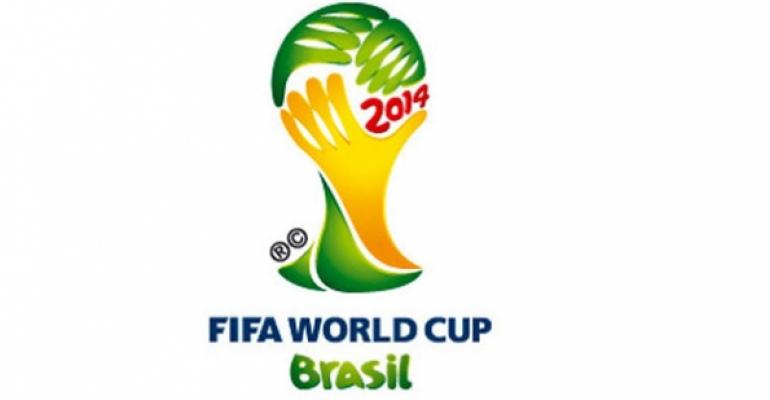As an avid soccer fan, I have to confess to being overly excited about the forthcoming soccer World Cup in Brazil, which kicks off in June. We will once again be put through the stresses and strains of 90 minutes shouting at the television, and hoping desperately that the 11 men on the pitch can emulate the team of 1966 — the last (and only) time England lifted the trophy.
So, with the eyes of the world watching, Brazil will be awash with visitors who have made the trip to be part of one of the biggest sporting events on Earth. This got me thinking about the effect a major sporting event has on a city or country’s restaurant industry.
If we cast our minds back to the last soccer World Cup in 2010, South Africa hosted, and the Vuvuzela provided the soundtrack to every match. It was the first international sporting event to be held on the African continent, and the South African government invested about $3.8 billion.
During the tournament, 309,554 foreign tourists visited the country, spending about $346.2 million. Nineteen percent of that was spent on food and drink, according to South Africa’s official tourism website, South African Tourism. According to research company Statistics South Africa, the country’s total food and beverage income amounted to about $3.7 billion that year. Unsurprisingly, many restaurants saw a significant rise in traffic, with South African restaurant group Famous Brands seeing a 24-percent increase in sales in June 2010 compared to the same month the previous year. It is worth noting that this followed an economic downturn in 2009.
RELATED
More from David Coffer
• The evolution of the coffee shop
• U.S. chains helping shape U.K. restaurant landscape
• More opinions
NEWS FROM NRN
• Crimea crisis complicates restaurant business in Russia, Ukraine
• Olympics fail to attract more casual-dining sales, traffic
• More international news
Although it seems like yesterday, it is now almost two years since the Olympic Games came to London in 2012. This was an incredible month of sport that showcased Britain in an excellent light (I appreciate I look at this from a biased, patriotic perspective). For the restaurant industry, however, it is a much more confused picture.
During the games, 900,000 people visited London, including 300,000 foreigners. Restaurant revenues were — according to credit card supplier (and Olympics sponsor) Visa — up by over 20 percent. However, according to the British Hospitality Association, the capital's restaurants trade dropped 40 percent on average during the opening weekend of the games. Many restaurateurs took to the press to voice their displeasure at the official messages, which advised visitors to avoid central London. The owner of one restaurant near St Paul’s Cathedral went as far as sending London Mayor Boris Johnson a bill for more than $150,000 after revealing her business’s revenue had dropped by 80 percent because of the games. It is worth noting at this point, however, that some of the fall has to be attributed to fewer people attending work due to the Olympics.
The London Olympics are overall expected to create about $21.8 billion worth of economic benefit, and it is fair to say that London and its restaurant industry are still benefiting from the promotion and positive exposure of the 2012 games.

Have you noticed an uptick or decrease in sales during major sporting events? Join the conversation in the comments below.
At the time of writing, figures about the economic benefit of the Sochi Olympics in Russia are scant. However, the initial response doesn’t seem too positive, with many people voicing their displeasure at the quality of food and the prices; if media reports are to be believed, the longest line in the food court in the Main Media Center was at McDonald’s. That said, previous Winter Olympic host cities have enjoyed a subsequent increase in revenue from tourism and food services, so we can only presume that the same will be true of Sochi.
So what is the prognosis for Brazil?
Brazil’s foodservice industry accounts for 18 percent of national production and is currently growing by approximately 14 percent per year. With up to 600,000 tourists arriving in the country and with rating agency Moody’s predicting an economic stimulus of $11.1 billion, the country’s restaurant market will be looking for a major boost this summer.
The challenge for restaurants, and the country more generally, is ensuring that the money is spent in other parts of the host cities and not — as seems to have been the case in Sochi — just within the event arenas. With concerns over security and growing unrest around the cost of hosting the tournament, this will be no mean feat. However, for those who do venture out, there are some wonderful restaurants to sample — notably in the Jardins district of São Paulo, and Copacabana beach and Ipanema in Rio de Janeiro.
If previous events are anything to go by, Brazil’s restaurant industry is in for a bumper few years, especially given that Rio de Janeiro is hosting the 2016 Olympic Games.
All I ask is that England doesn’t go out on a penalty shootout again this year!

